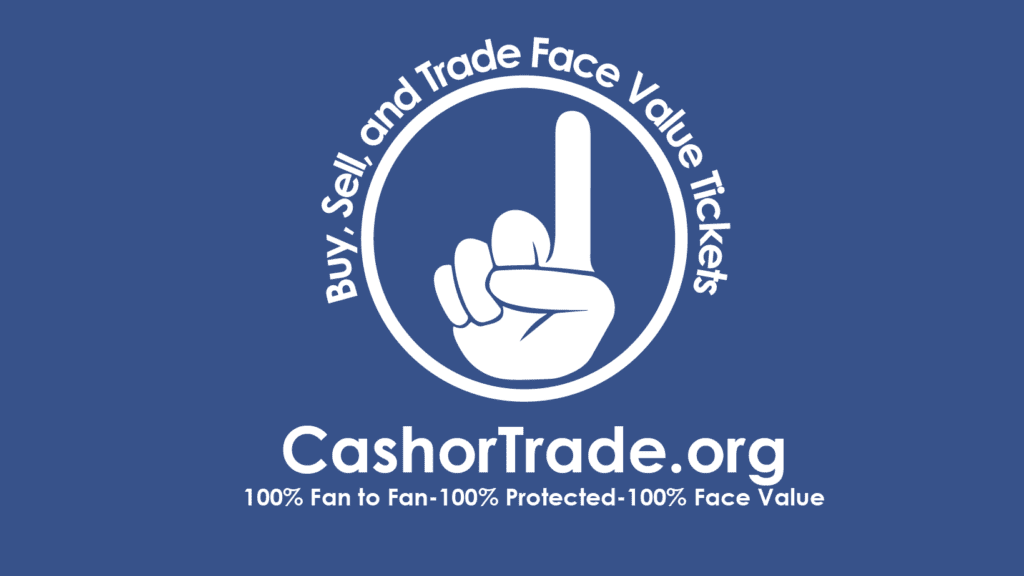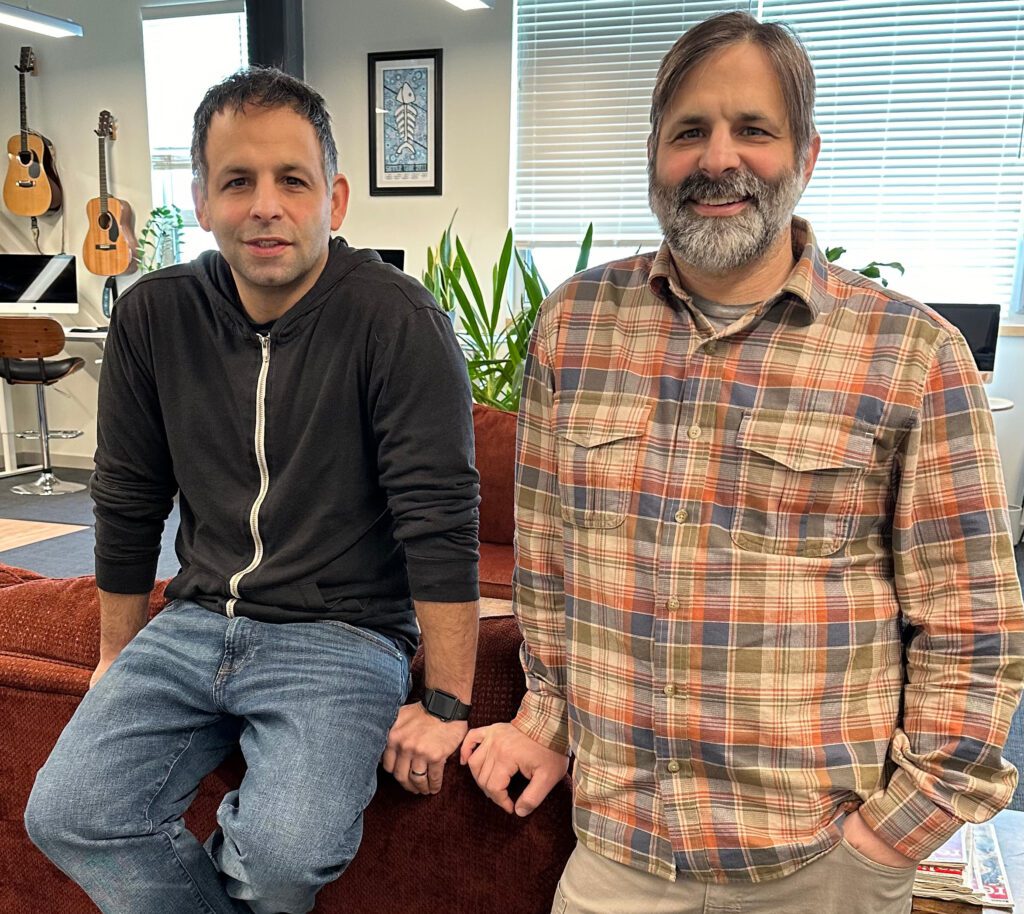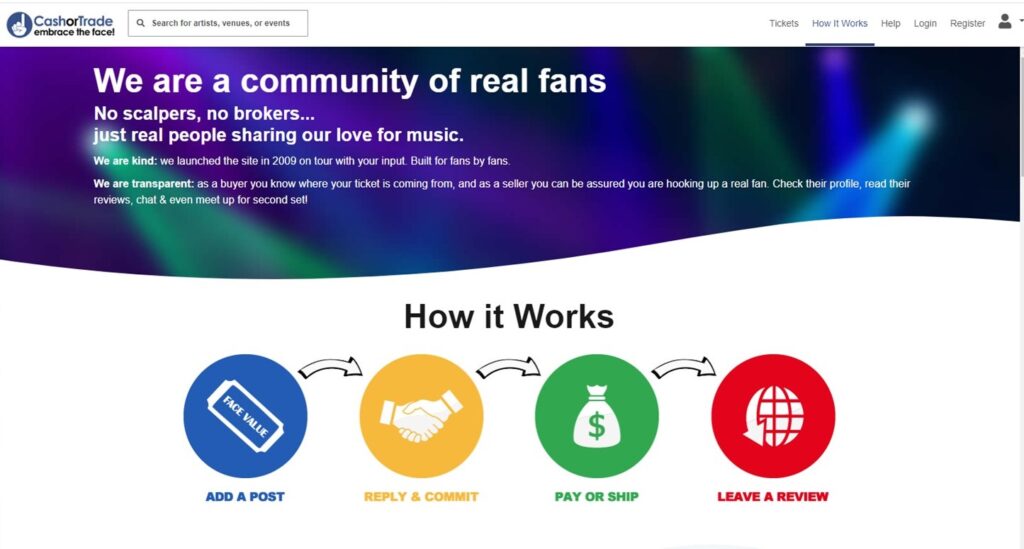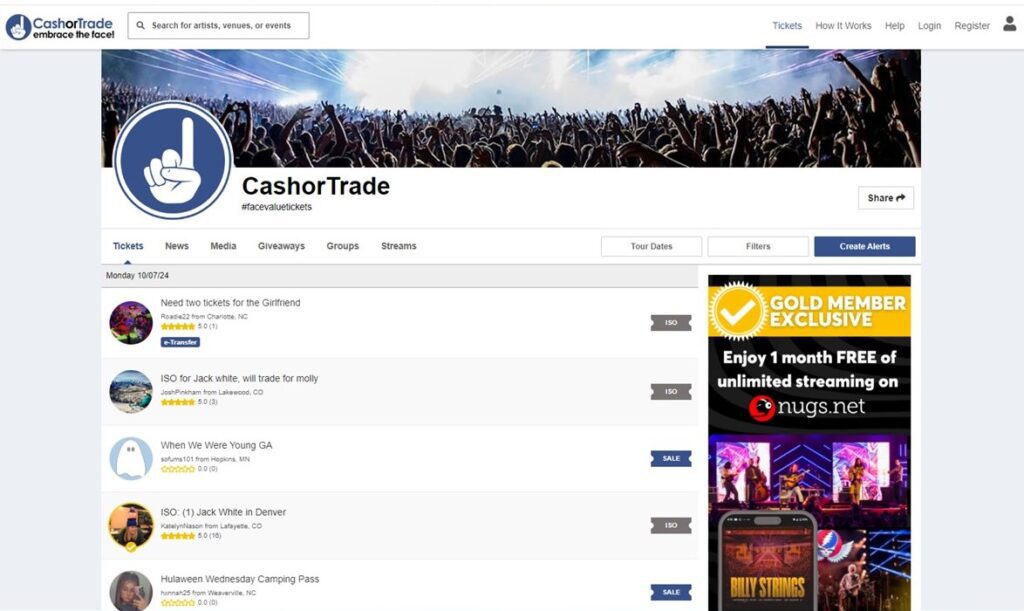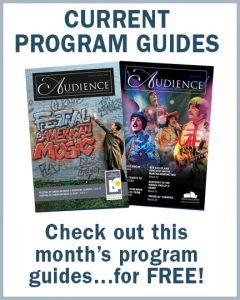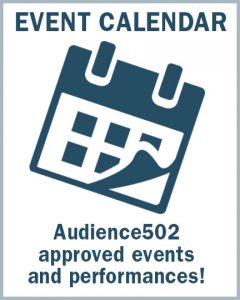In this Audience Interview, we are excited to dive into the world of digital ticketing and how to navigate the process and what has become the norm for concerts, events, festivals, and really any live performances. There are certainly pro’s and con’s to the digital ticketing world, but in the end, I think it’s here to stay. To get an inside perspective on some of the best practices for ticketing in today’s landscape, as well as an alternate outlet for face value tickets, we caught up with one of the founders of the online ticket trading platform, Cash or Trade. Brothers Dusty and Brando Rich launched Cash or Trade in 2009 as a user-friendly ticket platform to buy, sell, and trade concert tickets for real fans of music that was kind of built and cultivated for fans and buy fans. From what started as a ticket trading bulletin board in a Phish show parking lot, has grown into over 500,000 users and a integrated fan experience for a much better price.
Listen to the interview:
Doug Dreisbach: For our readers that are not familiar with Cash or Trade, can you give us a little bit of an elevator speech on what it is and how it has evolved to what it is today?
Dusty Rich: Cash or Trade is the world’s only face-value social ticketing platform, where fans have come together to buy, sell, and trade concert tickets and sporting tickets for face value and face value only, in a method to avoid the scalpers and brokers within the secondary resale market. So, that’s the quick title of the content. But I could give you the very quick story of how it began, where the pain point came, and what our solve was.
In 2003, my brother and I—we had this love to follow the band Phish. We had started in the ‘90s with the Grateful Dead, where they would go from show to show, and they would play different and unique set lists, and that would keep the community following the entertainment. And within this community, it was unlike any other live act, because you never knew what was going to happen from night to night. And in 2003, the band went on hiatus.
Now, what the landscape of ticket scalping was in those early days was what we all experienced, just one or two guys in line. You’d see them in front of the venue. They got a few tickets in their hands, a huge markup, and that was what scalping was, what we knew it to be in the old days. Well, during that time, there was the digital revolution. Everything went online and e-commerce was big, and tickets also followed. Now, all of a sudden, the face of scalping wasn’t that guy in front of the venue anymore, it was brokers using sophisticated software to purchase hundreds and thousands of tickets the second they went on sale, and then be anonymously relisted on the resale market. Now, the resale market wasn’t the guys standing anywhere now. There were website platforms where they can go and list them.
Now, the platforms benefitted off the limited transparency, and they allowed the brokers to start listing them at artificially inflated prices with very high fees for the seller and the buyer, so the higher the price of the ticket, the better it was for the company. So, they started putting in other tools, like price matching and mirroring demand, and giving the brokers alerts on, “Hey, you should mark your ticket up,” or “You should mark your ticket down” and playing supply and demand. And a normal fan, who just wanted to get their money back and return their ticket, would come here, and they were up against this sophistication, and a lot of the times they wouldn’t sell their ticket, while the brokers made their money from the 1%, playing on the heartstrings of fans, of human beings. That was what had transpired.
So, when we’re talking about scalping of tickets, we’re not talking about one or two people in front of the venue. We’re talking about an entire industry and model that supports it, and the primary ticketing industry is now actually the resale market, because the primary tickets don’t stay on sale, if it’s a highly sought-after event, for more than a few minutes. So, the rest of the fans are left to this whole business model.
That’s where we said, “It’s time. We need to change.”
DD: Well, we’ve all gotten online and sat there for the queue to start, and I’m number 15,000 in line, or whatever it is. It’s painstaking to have it, so great idea. So, you guys were probably in the same boat as a lot of people, thinking the same thing, but you actually had an action plan involved and put it together. What was it like, starting from the concept to putting that into—are you all web designers, or did you have to go out and consult with some friends?
DR: Yeah, we have Brando, and Brando and I were web designers for many years, building websites in the early days of the Internet. When we saw this problem—being fans, it happened to us, and we said, “You know what, how can we solve this?” Now, it wasn’t just the solving it with technology. We actually went on tour with Phish, came back, we got shut out of their shows, and we set up a tent in the parking lot with face-value tickets. And you’d always see people in the parking lot with their fingers in their ears, walking with “Cash or trade for your extras!” That was their slogan as they were looking for a ticket. “I’ll pay you cash, or I’ll trade you a ticket for another night, but do you have an extra ticket?” So, we said, “Oh, what a great idea. Let’s put up a bulletin board!” And fans would come up, and they would stick a little Post-it® note with their phone number and say, “Hey, give me a call if you have an extra ticket for face value, love to meet up, do the trade, make the transaction,” or “I have, tomorrow night, an extra ticket; do you have tonight?” And fans would come up to our tent and start—this is the low-tech version of Cash or Trade. So, it was almost like our proof of concept, and fans came up to us and said, “This is a great idea! We love what you’re doing!”
So, we went on the road, and we’re going to the next show. We talked in the Starbucks coffee shops, and we started coding a website for this. In the early days, it looked a lot like Craigslist. It would have a chronological listing order of ticketing, and we said, “You know what? Let’s pull in the social concept of the idea from Facebook of friending each other. Let’s pull in the review system idea from eBay, where fans can leave each other a review. Let’s pull in a chat platform, where fans could actually talk to each other and gain views,” and that’s pretty much how it was born.
And we launched the website. We told everyone, “Check out CashorTrade.org. We’re trying to build this face-value movement.” 5,000 fans signed up, and then 10,000, and as the years progressed, as we kept telling more and more fans about it, before we knew it, it was 100,000. Now, today, it’s almost a half a million fans on the platform, and then another half a million fans through our Facebook groups and other little social networks to kind of market the face-value movement and let the world know that there’s an alternative, and we’re building it within the fan community. So, that was a little story of how it began.
DD: So, tell me a little bit, Dusty—the way you started, from the parking lot to designing the website to 5,000, 10,000, and now half a million—what was it like for you and your brother to sit back and say, “Man, we are doing something”? And the platform goes live, people start interacting, and you see this idea go. What was that like for you and your brother to experience?
DR: Well, I will say, unlike any other tech startup, there was more than somebody saying that they really loved the service. It was actually seeing it in person, because we had developed websites before, and we had never had anyone come up and hug us about a good website. So, we would have people come out of the crowd, run up, give us a hug, “Oh, my gosh, thank you so much for building this community! I’m so happy to be a part of it! I got into the show last night. I got two of my friends in using Cash or Trade. This service is great. We really support what you guys are doing. Keep it going.” So, we were energized by that type of response, which kind of gave us the fuel that we needed to be like, “You know what, this is a purpose-driven idea. It’s not some Silicon Valley tech unicorn chase. This is something that we believe in, because it’s actually something that we want for ourselves, and we use it.”
So, that’s what helped energize us to continue the build and the development of this.
DD: If you could paint a scenario for our listeners a little bit about the process for a seller or a buyer—say I’ve got two tickets to a show in X city. I got on your website. Can you give us an idea of what that process looks like for the user?
DR: Sure. So, you access Cash or Trade, whether it’s through downloading the app, or go to the website, CashorTrade.org. You log in, usually create an account, and there’s a button there that you can push to post your tickets. And it’s a very simple process. You click. You put your seat, your row, and the face-value price of the ticket, and the second you post it, anyone who has an alert set up, who’s looking for that show that night, will get an instant email, text, or push notification to the phone. They can open up the app, and they can press a button to quickly respond to it.
Now, what makes it different—and a lot of question comes around, “How do you stop the scalpers from just hopping on the website, buying up all the tickets, and then reselling them?” Well, Cash or Trade is not a click-buy e-commerce user journey. It’s a lot like Airbnb and even Uber. You actually have to make an offer, and then your seller has the opportunity to choose the buyer. Even Uber—they don’t just send the car to you. The Uber driver has to accept the recipient, or even Airbnb—you can’t just buy the weekend. The Airbnb hosts have to review your profile, look at your reviews, and then accept the purchase. So, that just makes it an inefficient process for a broker to buy tickets on Cash or Trade, but actually rewards the fan who uses the platform, because they get to have some transparency. They use the chat program to ask some questions, like, “Oh, is there free parking? Do you know anything about the restaurants in the area?” And they can start a little communication, and then they can commit and purchase, and Cash or Trade will manage the transaction, so you’re not on the Internet just paying somebody. The money goes into our banking system. It’s an escrow. We wait for the transaction to confirm and validate, and then the funds will be transferred to the other party, making it secure, and we offer a 100% money-back guarantee and trader protection on those transactions.
DD: That’s probably the biggest fear about today’s digital world, is if you pay for something and it never comes. “All right, I’ll send you a Venmo, but I want the tickets first!” And they say, “Well, I want the Venmo before I’ll give the tickets!” So, it’s kind of a who’s going to jump first technique. But this eliminates a lot of that, which is really neat.
DR: And the Commit button was fun, when we made that, where both parties commit to a trade, because you can even make a transaction or a conversation with your friend, that Facebook friend who said, “Oh, I’ll take the tickets!” And you’re in an uncomfortable position of, “OK, well, you haven’t paid for it yet. You said you wanted it, but are you really committed?” And Cash or Trade helps automate that process, saying, “Well, you clicked the Commit the button,” and then both parties commit to the transaction, and then the platform will help facilitate the user journey, like, “OK, well, now it’s time for you to pay. Now it’s time for you to transmit the tickets. OK, now it’s time for you to leave a review,” so we help usher the relationship from start to finish.
DD: Are there one-off events and festival commerce on Cash or Trade? Like—obviously, Phish, jam band—Billy Strings, Dead & Company, and things like that? Say there’s—we just had a big festival here in Louisville called Bourbon & Beyond. It was four days of great music and everything. So, if that’s not really on the main platform of Cash or Trade, is there a new event or a new area?
DR: I will say that Bourbon & Beyond, last week—we had a lot of traffic. There were a lot of tickets that were transferred for Bourbon & Beyond. So, we do see festivals of all kinds pop up on Cash or Trade. And we partner with a lot of festivals, providing them with the safe resale option for their fans. So, as we’re scaling the company, we’re reaching out to different festivals, different artists, different promoters, and saying, “We offer safe resale, and we feel that more fans are less reluctant to purchase tickets, because it’s not like the old days, where it was $17, to make that kind of expense, knowing that there’s a safe place to resell them if they can’t make the event, and that it can go to another fan.” So, like Bourbon & Beyond, we’d love to even become an official partner, because we had such a great showing of them all last week.
But yeah, you’ll see all kinds of tickets pop up. We’ve got—even some Taylor Swift tickets popped up on there, making people very, very happy.
DD: I’ll bet, especially when they’re face-value, right?
DR: They’re face-value, and those are very difficult to get right now.
DD: We all know the ticketing world has changed so much in the last 10 or 15 years, but how has that really changed the landscape of events, and where do you think it’s going to go in the future? Are we going to see more Cash or Trade-style platforms popping up? How do you see this evolving?
DR: Well, my vision is that the face-value movement that we started comes to be widely known and mainstream, like Airbnb did for hotels and places to stay, where fans plug into the movement and really make the choice to say, “You know what? We’ve had enough. We are looking for an alternative, and we want a place that’s safe and transparent and for face value.” And as we start to scale and become integrated, and we’re working with primary ticketing companies to offer integrations, the integration would help cross-check the price, the face value, of the ticket, to confirm that it’s face, and also offer the API digital transfer, so you can do it right within our platform instead of bouncing out to do it on AXS Tickets or wherever you see tickets or wherever you purchased the ticket.
So, my vision for the future is for us to look back and say, “Oh, remember the time when all the tickets ended up in the resale market? It was run by brokers, and scalping of tickets, and these high prices and these obscene, inflated fees? All that is behind us, because there’s a new world.” It’s called CashorTrade.org. It’s a community where fans come together to buy, sell, and trade. And I would love for us to look back and say, “Wow, that was a time! And now, there is no market.”
Now, we’re not going to end capitalism or people wanting to profit. But I will say, like travel agents, hopefully there won’t be a need—so much a need for it. I mean, there are still travel agents, and it’s great, but we can book a car. We can book a plane and a hotel without the need of a third party in the middle, and we can certainly do that with ticketing.
DD: Absolutely. We can’t thank you enough for your time today. Is there anything you’d like to add for our listeners today?
DR: I would just want to say that it’s been one of the most satisfying things in my life to take part in providing people access to the live music experience, because I feel like our lives and our memories are made up of these core memories, and these events, to go out with our friends and family, are something that resonates with us forever, and if we can bring more of that to the world and the community, then I feel like I’ve lived my life with purpose. So, thank you for listening, and check out CashorTrade.org and join the community. And if you know a developer or somebody interested in marketing or PR and want to join the movement and help us build, we’re all ears.
Visit CashorTrade.org for more information and to Embrace the Face!

